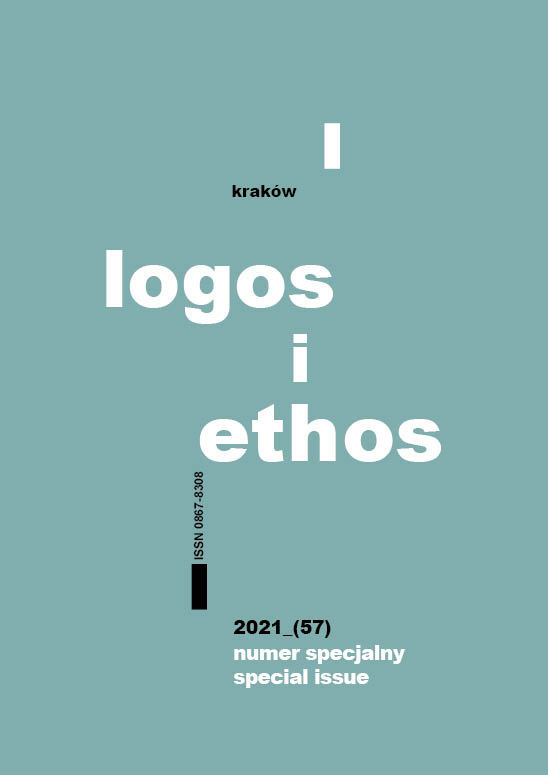The misery of the human condition and religion
DOI:
https://doi.org/10.15633/lie.4040Słowa kluczowe:
misery of the human condition, religion, hope, localness, universalismAbstrakt
The present essay is devoted to various aspects of the misery of the human condition and their references to religion, as conceived of by Leszek Kołakowski and Józef Tischner. After a preliminary presentation of the two thinkers, the author discusses example aspects of the misery in question, showing at what points Kołakowski’s thinking differed from that of Tischner. However, the author finds that the key issue is the evolution that took place in the views on this subject in each one of them. This evolution shows that Kołakowski’s and Tischner’s hopes for overcoming that which each one of them, in his own manner, understood as the misery of the human condition in the Polish localness were not fulfilled. Thus, Poles did not manage to attain universalism, as perceived by both the thinkers in the context of the Western European culture. This finding, however, involves a question about what in the contemporary culture, and particularly religion is local, and what is universal.
Bibliografia
Bergson H., Dwa źródła moralności i religii, trans. P. Kostyło, K. Skorulski, Kraków 1993.
Delsol Ch., Le Souci contemporain, Bruxelles 1996.
Dymarski Z., Między kapłanem a błaznem. O tolerancji w kontekście kultury, in: Tolerancja a edukacja, red. M. Patalon, Gdańsk 2008, pp. 72–80.
Kępiński A., Psychopatie, Warszawa 1977.
Kołakowski L., Czym jest socjalizm?, in: L. Kołakowski, Pochwała niekonsekwencji. Pisma rozproszone sprzed roku 1968, t. 2, Londyn 2002, pp. 172–176.
Kołakowski L., Etyka bez kodeksu, in: L. Kołakowski, Kultura i fetysze, Warszawa 2000, pp. 139–173.
Kołakowski L., Główne nurty marksizmu: powstanie – rozwój – rozkład, Londyn 1998.
Kołakowski L., Kapłan i błazen, in: L. Kołakowski, Pochwała niekonsekwencji. Pisma rozproszone sprzed roku 1968, t. 2, Londyn 2002, pp. 263–293.
Kołakowski L., Symbole religijne i kultura humanistyczna, in: L. Kołakowski, Kultura i fetysze, Warszawa 2000, pp. 219–239.
O sztuce oswajania liberalizmu. Z Leszkiem Kołakowskim rozmawia Piotr Kostyło, “Przegląd Powszechny” (1998) nr 4, pp. 14–30.
Tischner J., Chochoł sarmackiej melancholii, in: J. Tischner, Świat ludzkiej nadziei, Kraków 1992, pp. 15–28.
Tischner J., Ludzie z kryjówek, “Znak” (1978) nr 1 (283), pp. 57–72.
Tischner J., Upadek Ikara, in: J. Tischner, Ksiądz na manowcach, Kraków 1999, pp. 295–311.
Tischner J., Wstęp, in: J. Tischner, Świat ludzkiej nadziei, Kraków 1992, pp. 9–12.
Pobrania
Opublikowane
Numer
Dział
Licencja
Autorzy publikujący w czasopiśmie udzielają jego wydawcy zgody o następującej treści:
- Autor zachowuje autorskie prawa majątkowe do utworu, a jednocześnie udziela wydawcy czasopisma zgody na jego pierwszą publikację w wersji drukowanej i wersji online na licencji Creative Commons Uznanie autorstwa 4.0 Międzynarodowe oraz zgody na wykonywanie opracowań, w tym przekładów.
- Autor ma możliwość udzielania zgody niewyłącznej na opublikowanie utworu w wersji, która ukazała się w czasopiśmie (np. zamieszczenia go w repozytorium instytucjonalnym lub opublikowania w książce), wraz z informacją o jego pierwszej publikacji w czasopiśmie.
- Autor może umieścić swój utwór online (np. w repozytorium instytucjonalnym lub na swojej stronie internetowej) jeszcze przed zgłoszeniem utworu do czasopisma.

